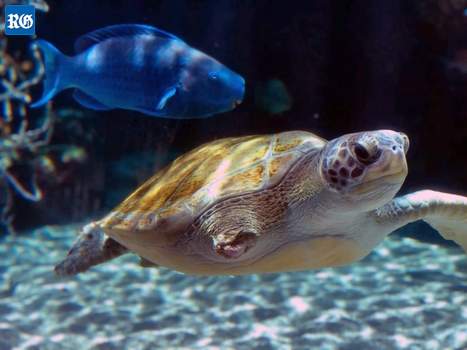Recent News
Geckos Lay Eggs At BAMZ Madagascar ExhibitFriday, April 04, 2014
The Bermuda Zoological Society [BZS] recently announced the beginnings of new life in the Bermuda Aquarium, Museum & Zoo’s Madagascar Exhibit, with both their Giant Day Geckos and Leaf-Tailed Geckos laying eggs.
Filming begins for Bermuda underwater documentary
Friday, March 21, 2014
Filming begins tomorrow on a TV documentary series which will explore the underwater life around Bermuda.
Students sign declaration for the conservation of the Sargasso Sea
Thursday, March 20, 2014
Last week students representing middle and senior schools across the island joined together at The Bermuda Aquarium, Museum Zoo.
Ocean Vet begins filming
Thursday, March 20, 2014
Lights, camera, ocean! Bermuda's journey from the deep blue on to the silver screen is underway as filming for the Bermuda-based Ocean Vet series starts tomorrow.
Ocean Vet Series To Begin Filming Tomorrow
Thursday, March 20, 2014
Filming for the highly anticipated marine life series Ocean Vet is set to begin in Bermuda tomorrow [Mar 21], with a 12-part documentary planned as the end result.
About
GovernanceAbout Us
Newsletter
Latest News
Gift & Bookstore
Contact
General Inquiries
info@bzs.bm
Latest News
All the latest updates and news from the Bermuda Aquarium, Museum, and Zoo, one of Bermuda's leading visitor attractions!
Press Release
Published Jun 7, 2018 at 2:38 pm (Updated Jun 7, 2018 at 2:38 pm)

Today, June 8th, is World Oceans Day, and the theme for this year is the prevention of plastic pollution to encourage healthy oceans. On World Oceans Day, people around our blue planet celebrate and honour the ocean, which connects us all.
According to the World Oceans Day organisation, “plastic pollution poses a threat to human health, kills and harms marine life, damages and alters habitats, and can have substantial negative impacts on local economies. Research from the Ocean Project shows that pollution, especially plastics pollution, is already widely accepted as a big problem that we need to and can address.”
“The primary direct threat to marine life is entanglement or ingestion. Sea turtles, birds, and fish alike accidentally mistake plastic for food and choke or get sick by ingesting it. It’s distressing to think about how much plastic is almost unavoidable — sometimes, it can seem useless to take action. But if many of us act together, we can reduce the amount of plastic in the ocean, and show the world that we demand less disposable plastic in our everyday lives!”
At the Bermuda Aquarium, Museum and Zoo (BAMZ) we continuously encounter situations involving plastics and our marine life. These situations include turtles who become entangled in fishing lines, which can lead to loss of flippers or even the death of the animal. Ingestion of plastics also cause major problems in preventing animals from digesting food because of blockages in their intestinal tract.
Ocean plastic debris is not only a serious concern for marine life, but it can also be dangerous to human health! Scientists are finding that chemicals in plastic consumed by fish eventually travel up the food chain — and get into our bodies. So, by littering, we are not only poisoning the environment, we are also poisoning ourselves.
The Bermuda Zoological Society is asking its members and the entire community to play a part in plastic prevention by saying “No” to plastic. Substitute plastics for biodegradable materials, and when you visit the beach this summer collect 3 pieces of plastic and dispose of it in the proper receptacle.
As part of the celebration of the 50th anniversary of the Bermuda Turtle Project, on June 27th, Dr. Ian Walker, Principle Curator at BAMZ will be giving a lecture at the BAMZ on wildlife rehibition and the impact plastic pollution has on our environment, particularly sea turtles. Come out and learn what we do to save our marine creatures!
• Press release from Bermuda Zoological Society


